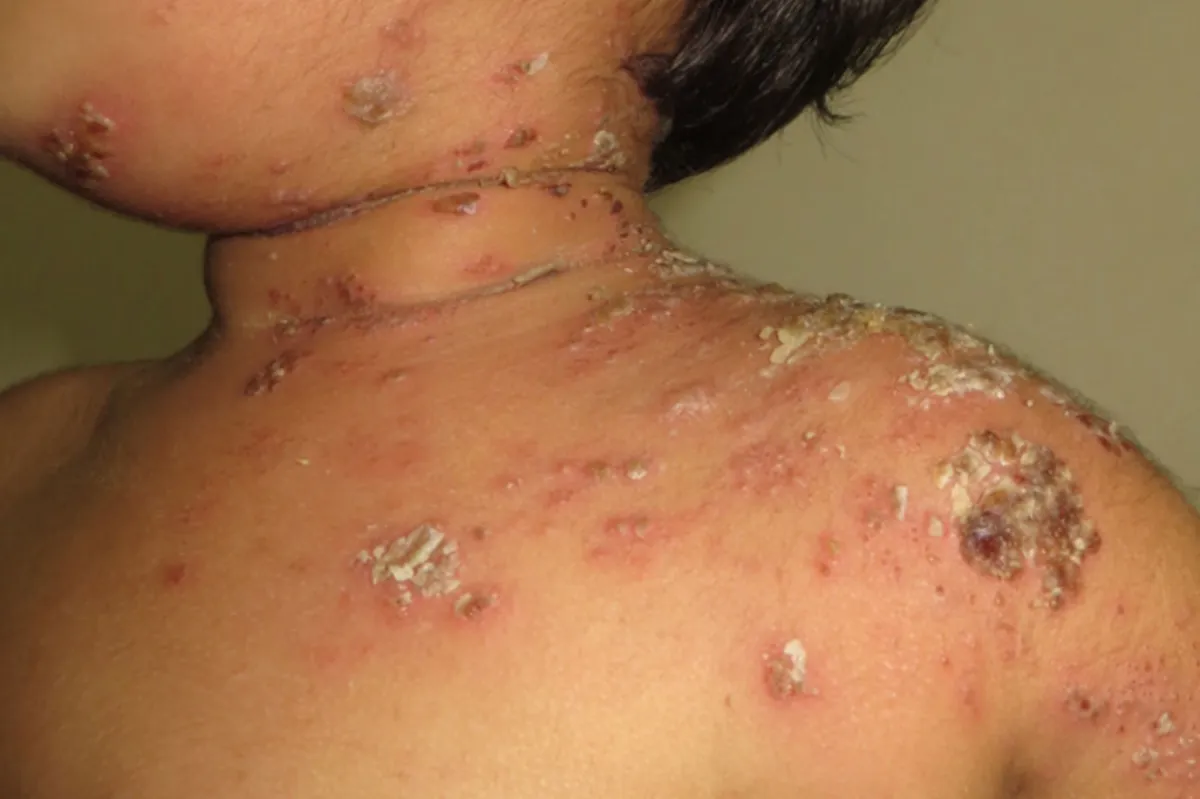What is Infected Eczema?
Infected eczema happens when people with eczema develop open sores that get infected by germs like bacteria, viruses, or fungi. It’s important to recognize the signs early to avoid complications.
What is Eczema?
Eczema, also called atopic dermatitis, is a skin condition that causes redness, itching, and sometimes sores. Scratching these sores can break the skin, allowing germs to enter and cause infections.
Who Gets Infected Eczema?
Not everyone with eczema gets infections, but people with frequent open sores are more likely to develop them. Knowing the signs of infection can help you get treatment quickly.
Signs of Infected Eczema
Here are some common signs that your eczema might be infected:
- Severe itching
- Burning feeling
- Blisters on the skin
- Fluid or pus (white or yellow) leaking from sores
- Fever and chills (in severe cases)
When to See a Doctor
If you notice any signs of infection, see a doctor right away. They will:
- Examine your skin
- Take a sample to identify the type of infection
- Prescribe the right treatment, such as antibiotics, antivirals, or antifungal creams
- Help manage your eczema to prevent future infections
Types of Infections
1. Bacterial Infections
The most common bacteria causing infections is Staphylococcus aureus (Staph). Symptoms include:
- Increased redness or darker patches on the skin
- Boil-like bumps
- Yellow drainage
- Itchiness, pain, or warmth in the infected area
2. Viral Infections
Viruses like herpes simplex can cause eczema herpeticum. Symptoms include:
- Painful, itchy blisters that may ooze pus
- Fever and swollen lymph nodes
Other viruses, like enterovirus or poxvirus, can also infect eczema, especially in children.
3. Fungal Infections
Fungal infections, such as candida or ringworm, can cause:
- Rashes, scaling, or sores
- Itchiness or soreness
- Ring-shaped patches (in the case of ringworm)
How is Infected Eczema Treated?
Treatment depends on the type of infection:
- Bacterial infections: Treated with antibiotics (creams or pills).
- Viral infections: Treated with antiviral medications or may heal on their own.
- Fungal infections: Treated with antifungal creams.
Steroid creams may also be used to reduce inflammation.
Natural and Home Remedies
Some people use natural treatments alongside medications. Examples include:
- Rosemary extract (for Staph infections)
- Aloe vera or chamomile (for eczema flares)
- Probiotics (to help with antibiotic side effects)
- Oatmeal baths or Epsom salt baths (to soothe skin)
Always talk to your doctor before trying natural remedies.
Complications of Infected Eczema
If left untreated, infected eczema can lead to:
- Worse eczema symptoms
- Longer healing times
- Blood poisoning (in severe cases)
Seek immediate medical help if you experience fever, chills, or extreme fatigue.
Can Infected Eczema Be Prevented?
Yes! Here are some tips:
- Avoid scratching your skin.
- Keep your skin moisturized.
- Use prescribed creams or medications to control eczema flares.
- Identify and avoid triggers like certain foods, allergens, or stress.
Key Takeaways
- Infected eczema is caused by bacteria, viruses, or fungi entering broken skin.
- Look for signs like pus, blisters, or fever and see a doctor if you suspect an infection.
- Treatment depends on the type of infection and may include antibiotics, antivirals, or antifungal creams.
- Prevent infections by managing eczema flares and avoiding triggers.
By taking care of your skin and seeking treatment early, you can reduce the risk of complications from infected eczema.

